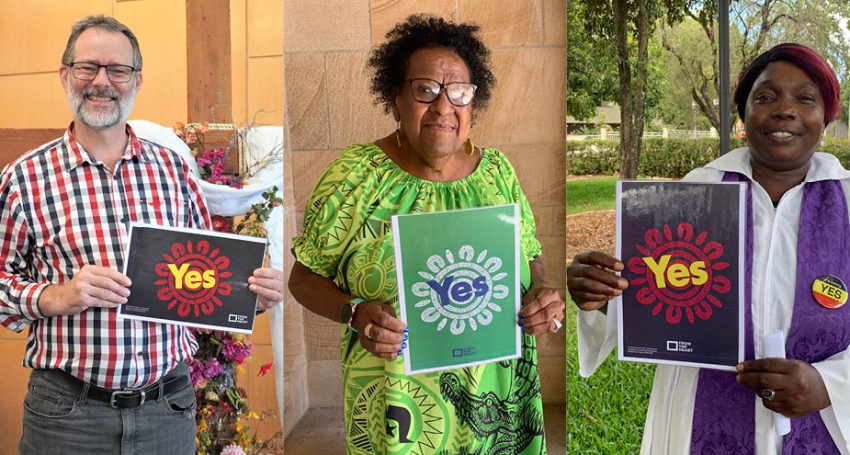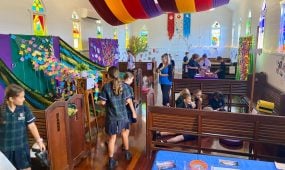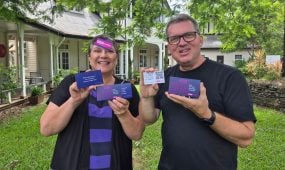Uluru Statement (including Voice to Parliament referendum) resources for clergy and lay leaders
Resources & Research
Check out these messaging principles and FAQ guides, video and other resources created to assist clergy, lay leaders and Christian communications professionals, so they can more effectively engage their congregations and wider communities about the Uluru Statement, including constitutional recognition through an Indigenous Voice to Parliament

The following content has been created and collated at the request of the Anglican Board of Mission, who is working with the National Aboriginal and Torres Strait Islander Anglican Council (NATSIAC – the Indigenous Voice to General Synod), to create an online portal of resources.
Australian Churches have been leaders in the Reconciliation space for decades, so the Anglican Church Southern Queensland sees our support of the whole Uluru Statement From the Heart, including the Voice to Parliament, to be consistent with this leadership.
The Anglican Church Southern Queensland seeks to build upon this legacy and the unifying 1967 referendum, which was publicly supported by the Anglican Primate of Australia and Archbishop of Brisbane, the late Philip Strong. In 1967 over 90% of voters voted ‘yes’ – this watershed referendum outcome was affirmed at Diocesan Synod that same year.
Our Constitution is 122 years old, but is yet to recognise Indigenous Australians who have been walking this land for thousands of years. This year, the Australians people have a chance to fix that with a referendum to give Aboriginal and Torres Strait Islander peoples a real say in their future.
1. Check out this messaging principles and tips guide for Christian leaders and advocates:
Download this Word doc for easy copying and pasting (uploaded on 1/5/2023).
Download this PDF for easy copying and pasting (uploaded on 1/5/2023).
Important: Because this resource will be updated regularly, please share the link to this anglican focus post in order to distribute this resource, rather than emailing the resource itself.
2. Check out this FAQ and ‘objection’ response guide for Christian leaders and advocates:
Download this Word doc for easy copying and pasting (uploaded on 1/5/2023).
Download this PDF for easy copying and pasting (uploaded on 1/5/2023).
Important: Because this resource will be updated regularly, please share the link to this anglican focus post in order to distribute this resource, rather than emailing the resource itself.
3. See and share this two-minute video message to Churches from Yes23 Alliance Campaign Director and Quandamooka man, Dean Parkin:
Post and share Dean’s video message to Churches, which has been published on the anglican focus news site.
Download Dean’s video message to Churches for hosting on your own Church channels.
Note: Dean’s complete video message is printed under the video in this anglican focus item.
4. Remember to celebrate this year’s National Reconciliation Week (NRW):
This year’s NRW theme is ‘Be a Voice for Generations‘.
This theme ties directly in with the Voice to Parliament referendum, as explained by Reconciliation Australia CEO Karen Mundine.
If you are hosting a particularly large event, remember to invite the media along by sending a media alert.
See this tips feature: ‘What is a media alert and why should I use one?’
5. Solicit and publish brief reflections from diverse folk, such as these with clear titles:
- ‘Why I support constitutional recognition through an Aboriginal and Torres Strait Islander Voice to Parliament: Aunty Dr Rose Elu‘
- ‘Why I am voting “yes” in the referendum: Sue Cooke‘
For more brief reflections, click on the links under the photos in the above items.
As per the messaging principles and tips guide at number 1 above, ensure that the brief reflections:
- Ground the Voice to Parliament in the Uluru Statement From the Heart.
- Appeal to shared values.
- Are solutions focused.
- Use positive framing.
- Show confidence in the Australian people.
- Focus on strengths rather than take a deficit approach.
- Are discerning when it comes to writing about human rights abuses.
- Use tangible terms and simple, jargon-free language.
- Emphasise human agency and opportunity.
- Emphasise Christian mission and identity.
- Draw upon examples showing what can be achieved when we work together.
- Are discerning about scripture choices.
- Refer to local initiatives/statements/events, rather than international ones.
- Build upon positive legacies (such as the 1967 referendum and National Reconciliation Week).
- Tailor messaging for the given audience and the given communications channel.
- Use respectful language that builds rapport and trust.
- Encourage use of narrative / personal story.
- Are aligned with the Yes23 Campaign Alliance messaging (see page 6 of this guide).
Remember to publish the brief reflection with a photo of the writer.
For more information about these reflections, contact the anglican focus editor, Michelle McDonald, via focus@anglicanchurchsq.org.au.
6. Solicit and publish Q&A items that include questions about the Uluru Statement, the Voice to Parliament and this year’s National Reconciliation Week:
For example, check out this Spotlight Q&A: ‘Q&A with Ministry Development Officer, cyclist, gardener and vocational deacon, The Rev’d Tim Booth’.
7. Write news stories, media releases and blog posts updating your congregations and communities about what your Church is doing:
Keep your congregations updated with news stories about Voice to Parliament and Uluru Statement initiatives and events.
See this tips feature: ‘How to blog successfully: framework and tips for church leaders’.
For a free ‘paint by numbers’ media release writing template, please contact the anglican focus editor, Michelle McDonald, via focus@anglicanchurchsq.org.au.
8. Encourage people in your congregations to get engaged by volunteering:
- with your Church’s justice unit or Reconciliation Action Plan Working Group.
- to organise a National Reconciliation Week event (This year’s NRW theme is ‘Be a Voice for Generations‘).
- in an organised delegation to speak to Members of Parliament (see this tips feature about ‘How to lobby politicians: community organising tips for effectively mobilising volunteers’).
- with the Yes23 campaign (community members can register to volunteer on the Yes23 website).
- as part of the ‘Together, Yes’ kitchen conversations movement in support of the ‘yes’ vote (conversation skills learnt are built on respect, listening and learning).
9. Encourage your Church organisation and individuals to make Parliamentary and Government submissions:
We are blessed with a vibrant democracy, so engage in it by making submissions like these:
ACSQ submission in support of a First Nations Voice (2021)
10. Create a timeline like this showing your Church’s Reconciliation legacy:
- 1967: Before the referendum, the Diocese of Brisbane’s Archbishop Philip Strong (while also serving as the Primate) was quoted advocating for the ‘yes’ vote in a news story in The Australian, with the headline, “Archbishop pleads for Yes vote on Aboriginals”.
- 1967: Soon after, the Archbishop of Brisbane and Primate Philip Strong joined 11 other Church leaders who “issued a statement urging Christians to vote ‘yes’ on the referendum question”.
- 1967: At the Diocese of Brisbane’s Synod, after the referendum, a motion was carried that “welcomes the affirmative vote in the recent referendum”.
- 1993: The Week of Prayer for Reconciliation was initiated, now better known as National Reconciliation Week, which is facilitated by Reconciliation Australia.
- 1997: Diocesan publication FOCUS (a precursor to anglican focus) publishes a commemorative story on the 30th anniversary of the ‘yes’ vote. The story explains that: “Archbishop Philip Strong while affirming the 1967 referendum’s ‘overwhelming ‘yes’ majority’ at the Diocese of Brisbane’s Synod in the same year, said: ‘If our hearts are fixed on a right principle in a changing world, the principle must be acted upon and continue to be in the midst of changing circumstances’.”
- 2008: The Anglican Diocese of Brisbane endorses General Synod’s 2007 Joint Affirmation of Faith and Justice with Aboriginal and Torres Strait Islander peoples, including acknowledging General Synod’s 1998 apology for the Stolen Generations.
- 2011: On behalf of the Anglican Diocese of Brisbane, the Social Responsibilities Committee made a submission in support of constitutional recognition to the Expert Panel on Constitutional Recognition of Indigenous Australians.
- 2016: The Anglican Church Southern Queensland (ACSQ) launched its first Reconciliation Action Plan, which was ratified by Diocesan Synod and later approved by Reconciliation Australia.
- 2017: After The Uluru Statement From the Heart (which includes constitutional recognition through a Voice to Parliament) was signed at a National Constitutional Convention and presented to the Australian people as an invitation, the Anglican Church Southern Queensland decided to support the Anglican Board of Mission’s 2017 call for “a Constitutionally Entrenched First Nations Voice”.
- 2017: The National Aboriginal and Torres Strait Islander Anglican Council (NATSIAC) endorses the Uluru Statement From the Heart, including the Voice (NATSIAC is the Aboriginal and Torres Strait Islander voice to General Synod – Aunty Dr Rose Elu and The Rev’d Canon Bruce Boase are NATSIAC members).
- 2018: Individual ACSQ parishes and ministries started responding to the Uluru Statement’s invitation, “to walk with us in a movement of the Australian people”, including through initiatives and events.
- 2021: The Anglican Church Southern Queensland launched its second Reconciliation Action Plan, which was ratified by Diocesan Synod and approved by Reconciliation Australia – the new RAP endorses the whole Uluru Statement From the Heart, while expressing clear support for constitutional recognition through a Voice.
- 2021: The Anglican Church Southern Queensland made a submission to the Co-design Process Senior Advisory Group Co-chairs (via the Federal Government’s website) in support of the Voice to Parliament and Government (the submission was drafted by the Reconciliation Action Plan Working Group and approved by Diocesan Council).
- 2022: The National Aboriginal and Torres Strait Islander Anglican Council (NATSIAC) reaffirmed support for the Uluru Statement From the Heart, including the Voice (NATSIAC is the Aboriginal and Torres Strait Islander ‘voice’ to General Synod – Aunty Dr Rose Elu and The Rev’d Canon Bruce Boase are NATSIAC members).
- 2022: After nearly two years of RAP Working Group enquiry, reflection and discussion, Diocesan Council approved the Anglican Church Southern Queensland formally partnering with From The Heart, the Voice to Parliament campaign stemming from the 2017 National Constitutional Convention (the ACSQ was the first Church nationally to do so).
- 2023: A number of ordained and lay Anglicans across the ACSQ join the ‘Faith Leaders for Voice Network’ of the Queensland Community Alliance.
- 2023: In line with the Diocese’s position, anglican focus begins publishing reflections by Indigenous and non-Indigenous ACSQ community members about why they are choosing to vote ‘yes’.
- 2023: On behalf of the Anglican Church Southern Queensland, senior ACSQ Aboriginal and Torres Strait Islander Elders, the Social Responsibilities Committee, Anglicare Southern Queensland and the Anglican Schools Commission made a joint submission to the Parliamentary Joint Select Committee in support of the referendum’s proposed wording.
Editor’s note: The Anglican Church Southern Queensland (ACSQ) supports the Anglican Board of Mission’s 2017 call for “a Constitutionally Entrenched First Nations Voice”. The ACSQ also supports the Anglican Church of Australia’s Joint Affirmation of Faith and Justice with First Nations Peoples (carried by affirmation at General Synod, Oct 2007), and seeks practical ways to do so, including our association with Reconciliation Australia and the prescribed process of Reconciliation Action Plans.
Jump to next article





